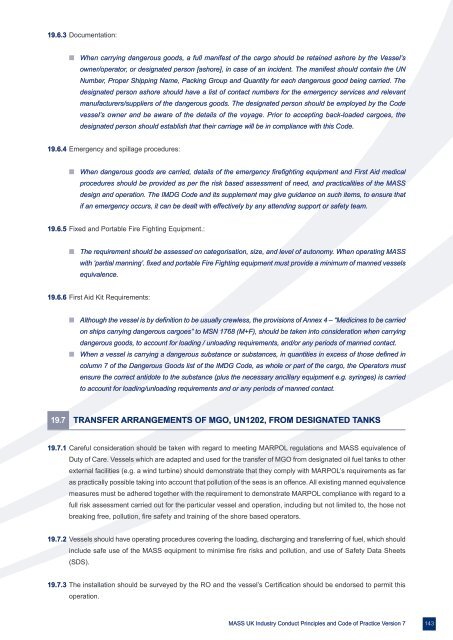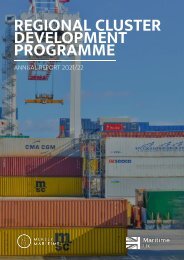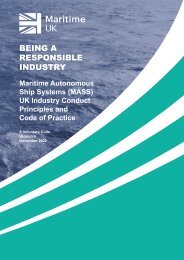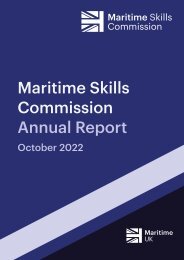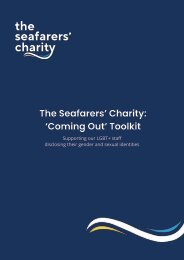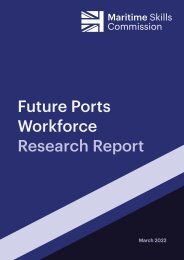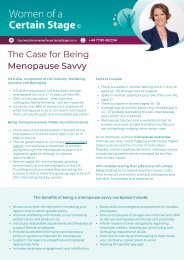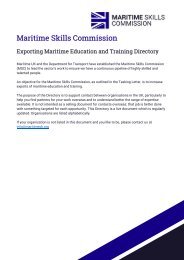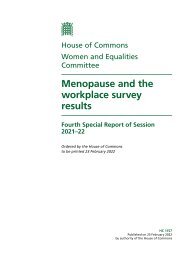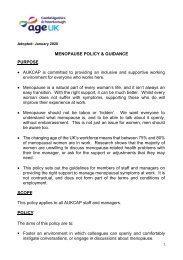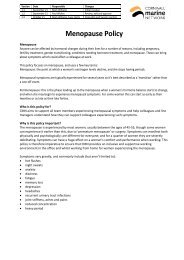COP_2023_V7_pages
You also want an ePaper? Increase the reach of your titles
YUMPU automatically turns print PDFs into web optimized ePapers that Google loves.
19.6.3 Documentation:<br />
n When carrying dangerous goods, a full manifest of the cargo should be retained ashore by the Vessel’s<br />
owner/operator, or designated person [ashore], in case of an incident. The manifest should contain the UN<br />
Number, Proper Shipping Name, Packing Group and Quantity for each dangerous good being carried. The<br />
designated person ashore should have a list of contact numbers for the emergency services and relevant<br />
manufacturers/suppliers of the dangerous goods. The designated person should be employed by the Code<br />
vessel’s owner and be aware of the details of the voyage. Prior to accepting back-loaded cargoes, the<br />
designated person should establish that their carriage will be in compliance with this Code.<br />
19.6.4 Emergency and spillage procedures:<br />
n When dangerous goods are carried, details of the emergency firefighting equipment and First Aid medical<br />
procedures should be provided as per the risk based assessment of need, and practicalities of the MASS<br />
design and operation. The IMDG Code and its supplement may give guidance on such items, to ensure that<br />
if an emergency occurs, it can be dealt with effectively by any attending support or safety team.<br />
19.6.5 Fixed and Portable Fire Fighting Equipment.:<br />
n The requirement should be assessed on categorisation, size, and level of autonomy. When operating MASS<br />
with ‘partial manning’. fixed and portable Fire Fighting equipment must provide a minimum of manned vessels<br />
equivalence.<br />
19.6.6 First Aid Kit Requirements:<br />
n Although the vessel is by definition to be usually crewless, the provisions of Annex 4 – “Medicines to be carried<br />
on ships carrying dangerous cargoes” to MSN 1768 (M+F), should be taken into consideration when carrying<br />
dangerous goods, to account for loading / unloading requirements, and/or any periods of manned contact.<br />
n When a vessel is carrying a dangerous substance or substances, in quantities in excess of those defined in<br />
column 7 of the Dangerous Goods list of the IMDG Code, as whole or part of the cargo, the Operators must<br />
ensure the correct antidote to the substance (plus the necessary ancillary equipment e.g. syringes) is carried<br />
to account for loading/unloading requirements and or any periods of manned contact.<br />
19.7 TRANSFER ARRANGEMENTS OF MGO, UN1202, FROM DESIGNATED TANKS<br />
19.7.1 Careful consideration should be taken with regard to meeting MARPOL regulations and MASS equivalence of<br />
Duty of Care. Vessels which are adapted and used for the transfer of MGO from designated oil fuel tanks to other<br />
external facilities (e.g. a wind turbine) should demonstrate that they comply with MARPOL’s requirements as far<br />
as practically possible taking into account that pollution of the seas is an offence. All existing manned equivalence<br />
measures must be adhered together with the requirement to demonstrate MARPOL compliance with regard to a<br />
full risk assessment carried out for the particular vessel and operation, including but not limited to, the hose not<br />
breaking free, pollution, fire safety and training of the shore based operators.<br />
19.7.2 Vessels should have operating procedures covering the loading, discharging and transferring of fuel, which should<br />
include safe use of the MASS equipment to minimise fire risks and pollution, and use of Safety Data Sheets<br />
(SDS).<br />
19.7.3 The installation should be surveyed by the RO and the vessel’s Certification should be endorsed to permit this<br />
operation.<br />
MASS UK Industry Conduct Principles and Code of Practice Version 7 143


